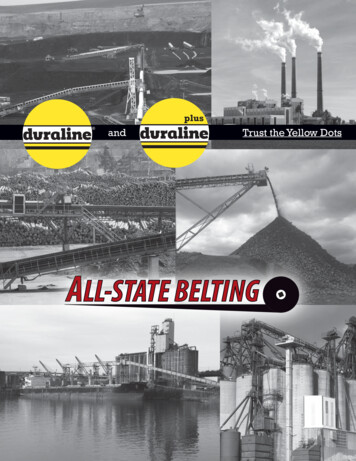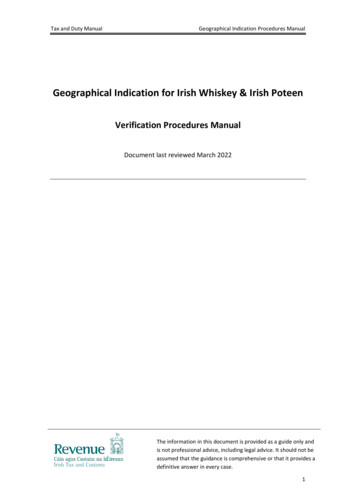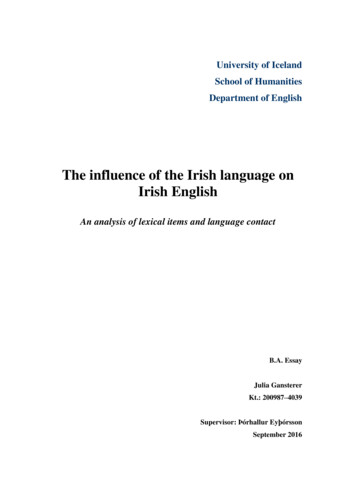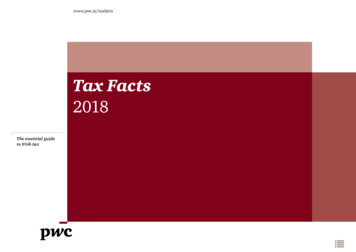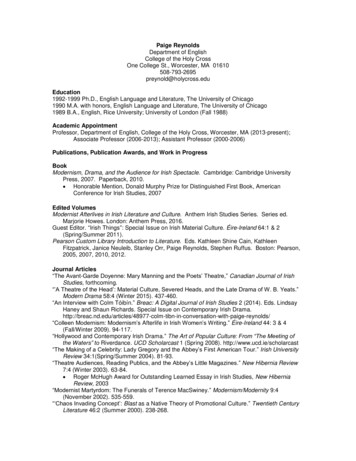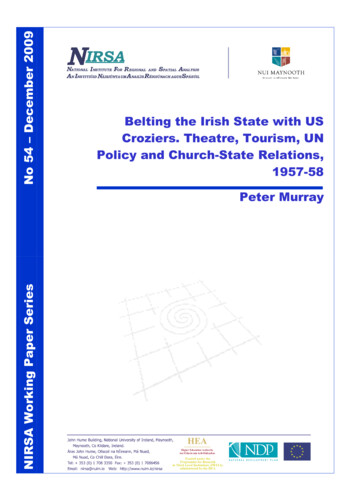
Transcription
No 54 – December 2009Belting the Irish State with USCroziers. Theatre, Tourism, UNPolicy and Church-State Relations,1957-58NIRSA Working Paper SeriesPeter Murray
Belting the Irish State with US CroziersTheatre, Tourism, UN Policy and Church- State Relations, 1957-58Peter MurrayDepartment of Sociology / National Institute for Regional and Spatial AnalysisNational University of Ireland, Maynooth, IrelandDepartment of SociologyNUI MaynoothCounty AbstractIn February 1958, the Irish Catholic Hierarchy sent a letter to its US counterpart. Theletter stated that the UN policy of the Irish government did not represent the feelingsof Irish Catholics’. It also called on the US bishops make their influence effectivelyfelt’ by Irish representatives in the United States in relation to two plays in theprogramme of the 1958 Dublin Theatre Festival which the Archbishop of Dublinregarded as objectionable. This was to be done by, in effect, threatening to encouragea US tourist boycott of Ireland. On neither of these matters had the Irish hierarchymade representations to the Irish government. This paper reproduces the letter, setsout the context in which it was sent, examines the response to it by churchmen in theUSA and the role this played in bringing about the postponement of the TheatreFestival. Irish diplomatic and ministerial reaction to the discovery of what the Irishhierarchy had done is also discussed.
IntroductionWhere third party involvement in the relationship between Dublin governments andthe Irish Catholic Hierarchy is discussed, the Vatican is usually the focus of attention.Examples of its involvement include Eamonn De Valera dispatching the Secretary ofthe Department of External Affairs to seek approval for key provisions in the draft ofthe 1937 Constitution and Garret FitzGerald later seeking endorsement from the samequarter for changes to that document – as well as to state and church laws - intendedto promote island-wide peace and reconciliation (Keogh and McCarthy 2007: 162170; FitzGerald 1991: 184-187). This paper explores in detail an attempt in the late1950s to involve a different third party – the US Catholic hierarchy – in southern Irishchurch-state relations. A brief previous reference 1 to the episode can be found in JohnCooney’s biography of John Charles McQuaid:The crusade against the two plays was internationalized when the twosecretaries of the Hierarchy’s standing committee, Bishop MacNeely of Raphoeand Bishop Fergus of Achonry, sent a letter to the American bishops explainingwhy McQuaid had felt compelled’ to cancel the Mass on account Tostal’sselection of O’Casey and Joyce. In an extraordinary initiative, they asked theirpowerful American counterparts to apply pressure on de Valera’s government toban objectionable plays from the stage. The Irish bishops further confronted theGovernment by stressing that a recent decision by the Minister for ExternalAffairs, Frank Aiken, to vote for discussion of China’s admission to the UnitedNations did not reflect the views of Irish Catholics’.This letter was dynamite in the hands of Cardinal Spellman. At a lunch in theCardinal’s New York residence with Frank Aiken and Frederick Boland, theCardinal brought up the subject of the Bishop’s letter. A flaming row ensued,with Boland pointing out that Aiken’s vote had been endorsed by a two-thirdsmajority in the Dail, a fact which the two Irishmen regarded as the crowningargument’ against Spellman and McQuaid. The American bishops, however,remained so angry over the vote on China that they encouraged a boycott ofpilgrimages to Ireland, which act constituted a tremendous blow to the touristindustry of an ailing economy. (Cooney 1999: 330)This paper begins by reproducing in full the letter John Cooney refers to. It then tracesthe emergence of efforts to utilize the internationally admired Irish theatrical traditionto enhance earnings from tourism and the Irish government’s independent policystance at the United Nations as bones of contention between it and CatholicChurchmen on both sides of the Atlantic. It adduces evidence that, while CardinalSpellman was certainly incensed by the China vote, his strength of feeling on the issuewas shared by hardly any other bishops and by relatively few of the Irish-Americanlaity. Cancellation of the 1958 Dublin Theatre Festival followed the emergence ofchurch disapproval into the open in January of that year. This was brought about bythe withdrawal of the Festival’s subvention from public funds via Bord Failte andappears to have been prompted by fears of the damage any boycott campaign, shouldone emerge, would do to the Irish transatlantic air service which was due to beinaugurated in April 1958. With the offending plays removed (along with the nonoffending ones), Spellman was in fact mollified at the meeting Cooney refers to andthere is no evidence of any tourist boycott being encouraged thereafter by US bishops.Indeed the available evidence suggests that in general they responded negatively to2
the call for them to put pressure on Irish government representatives while a casestudy of a bishop who shared Spellman’s opposition to the China vote, ArchbishopCushing of Boston, shows him maintaining his longstanding support for pilgrimageand other tourism to Ireland despite his disagreement with the Irish government’sstance in the UN. The paper’s concluding section looks at the state response to thisextraordinary church initiative and glances at the longer-term effects of this belt ofthe crozier’ on the state’s foreign policy and on the Dublin theatre festival project.Box 1Letter from William McNeeley, Rahoe and James Fergus, Achonry, Secretariesto Cardinal Mooney, Archbishop of Detroit 4/2/1958 2The Standing Committee of the Irish Hierarchy, at its meeting on 14th January 1958under the chairmanship of His Eminence Cardinal D’Alton, thought well to bring tothe notice of Your Eminence, and through Your Eminence to the notice of the wholeUnited States’ Hierarchy, the following points of information:1 Mr. Aiken’s Speech.The Catholic Bishops of Ireland read with surprise and disappointment the speech ofMr. Aiken at the United Nations General Assembly, last September. They wish toassure the United States’ Hierarchy that Mr. Aiken’s views did not represent thefeelings of Irish Catholics2. An TostalAs Your Eminence and your Venerable Brethren are probably aware, a festival calledAn Tostal is organized here each year, about Easter, in the various cities and towns,one of the chief objects of which is to attract visitors to Ireland. The committeeresponsible for organizing An Tostal in Dublin, in the present year, has proposed toput on, as an attraction for visitors, a dramatisation of James Joyce’s Ulysses and aplay by Sean O’Casey which no one has yet seen, and, in spite of strong objection andprotest by His Grace the Archbishop of Dublin, has decided, at a recent meeting, toproceed with this project.An Bord Failte, the government sponsored Board for the promotion of tourism,though not itself responsible for the actual Tostal arrangements, gives a substantialsubsidy to the festival.Knowing that our tourist bodies depend to no small extent on the support of theCatholics of the United States and have been accustomed to seek the good will of theUnited States’ Bishops, the Standing Committee felt that Their Excellencies shouldknow the situation as it exists. The Bishops of the United States could make theirinfluence effectively felt by expressing their views to Irish Representatives in theUnited States.The Standing Committee will be obliged if Your Eminence and the United States’Hierarchy treat this letter as confidential and for their personal information3
The Theatre as an Irish Tourism assetAt the end of World War Two the Irish state was internationally isolated. Membershipof the United Nations was denied to it until 1955 and the main forums open to it in theearly post-war years were European ones such as the Organisation for EuropeanEconomic Co-operation (OEEC). Becoming a member of OEEC was a condition ofreceiving U.S. Marshall Aid through the European Recovery Programme (ERP).Marshall Aid recipients were expected to actively address the dollar gap’ between the(small) amount they earned from selling goods and services to the USA and the(large) value of the goods originating in the dollar area that they were consumingthanks in large part to an aid programme that would not continue beyond 1952(Whelan 2000; Murray 2009). An Inter-Departmental Working Party on DollarEarnings set up in late 1948 was the first Irish effort to address the dollar gap issueand it focused its attention on increasing tourist numbers from the USA.The theatre first figured in its deliberations when the suggestion that the AbbeyTheatre might go on a US tour was made but, in the light of Ernest Blythe’s reactionto it, the Working Party decided that it would be unprofitable to pursue this point’.Shortly afterwards the Working Party heard from the Chairman of the Irish TouristBoard that consideration was being given to an annual drama festival with the firstone to be held in October 1950 - Mr. Quinlan thought that this Festival would be ofinterest to many Americans – especially those connected with universities. The Boardhad been informed that there were 540 registered universities in the U.S.A., many ofwhich contained a faculty of drama’. 3It was not until 1957 that an annual drama festival’ was launched. Then it took placeunder the umbrella of An Tostal. Ireland’s springtime festival’, the Tostal was anattempt initiated in 1953 to lengthen the tourist season by giving it an earlier start.Local Tostal Councils around the country organised their own programmes with theaid of subventions from Bord Failte. These Councils were elected by subscribers offunds to support the local programmes. The number of Tostal Councils fluctuatedfrom year to year and Bord Failte was sometimes obliged to step in directly as when the secession of the Dublin Council from all activities [left] the Board with the fullresponsibility of organizing and presenting the programme in Dublin in 1955’. 4 TheDublin Council had been revived by the time the Dublin Theatre Festival waslaunched in 1957. The Dublin Theatre Festival Committee was then constituted as asub-committee of the Dublin Tostal Council with some additional co-opted members.Unlike England, Ireland did not have a formal system of theatre censorship (Dean2004). Indeed plays barred from the London stage had occasionally been put on inDublin – the 1909 Abbey Theatre production of George Bernard Shaw’s TheShewing-up of Blanco Posnet being a case in point. By the 1950s the absence of amechanism controlling the Irish stage co-existed with a censorship of books that hadbecome internationally notorious (Adams 1968). Attempts to promote Irish theatre toan international audience for tourism business purposes ran the risk of incurring thewrath of those who championed censorship in the drastic form in which it was appliedto other art forms in Ireland. This potential for conflict made an early appearancewhen, via Bord Failte, the Department of External Affairs fielded a query fromTheatre Festival Director Brendan Smith in October 1956. Smith had been in contactwith Hungarian and Russian companies that were willing to participate in a Dublinfestival. These would be comparatively cheap to bring over and Smith’s query was4
whether there would be any objection on the political side’. Correctly anticipatingthat such objection would be expressed, the External Affairs officer who first receivedthe query noted that:There is no doubt that the Moscow Arts Theatre would be a great draw amongstAmericans and other visitors to Ireland and also for many of our own people inview of the influence of the Moscow Theatre on the Abbey in its early days. Onthe other hand it is fairly safe to assume that there would be opposition from theChurch and from certain sections of the Irish public to what they would regardas Communist penetration through culture. 5Trouble duly arrived during the first (May 1957) theatre festival with a police raid onthe Pike Theatre production of Tennessee Williams’ The Rose Tattoo and theprosecution of its Director, Alan Simpson (Whelan with Swift 2002). Despite this,much positive publicity was received by the Festival, to which Bord Failte hadbrought over a party of British newspaper drama critics. A lengthy appraisal writtenby the Irish Ambassador in London, Cornelius Cremin, in June 1957 noted theongoing Pike Theatre prosecution but judged the recent festival as a whole to havebeen a success and the theatre to represent as good a focal point for developingEnglish tourist interest as Ireland had available:The decision to centre this year’s Tostal on a theatre festival in Dublin wasgenerally welcomed. Ireland’s reputation for both plays and actors stands highin this country where Wilde, Shaw and O’Casey are regarded as being amongstthe dramatic masters of the last fifty years in the English-speaking world andwhere the name of the Abbey is still mentioned with respect. Interest in Irishplaywrights has been stimulated recently by the London productions of SamBeckett’s plays and by the success of Brendan Behan’s “Quare Fellow”. Toeducated English people, therefore, the theatre appeared a natural choice for anIrish tourist festival One may conclude that, as far as the more serious organsof the English press is concerned, the theatrical festival was a success criticsseem to have found most stimulation in the efforts of the little theatres,especially the Pike How successful the theatre festival was as a touristattraction we are not, of course, in a position to surmise but it certainly wouldnot be unreasonable to suppose that, as a result of this year’s effort and withplenty of advance publicity, a similar festival in the spring of 1958 should haveevery prospect of attracting English visitors in considerable numbers. Theappeal of a serious theatrical festival is, of course, limited to the educatedclasses but in a population of 50 million these represent a far from negligiblenumber In any event it seems certain that, having regard to the reputationwhich Ireland enjoys in the world of theatre, a theatrical festival is likely toprove a better tourist attraction as far as England is concerned than virtually anyother enterprise that might be feasible. 6By the Autumn of 1957 preparations for a second international theatre festival thatwould again be put on as part of the overall Tostal programme were getting underway. Promotional work on its behalf was being undertaken by Bord Failte in NorthAmerica as well as in Britain. Two premieres that might draw visitors to Dublin forthe event were planned and a brochure for the upcoming festival highlighted theseattractions:5
May 11th-26th Tostal 1958 Ireland’s Sixth Springtime Festival – The highlightof Dublin’s Tostal programme will be the Second International Theatre Festival,a fitting event in view of Dublin’s great theatrical tradition which through thecenturies has embraced so many great names from Goldsmith and Sheridan toShaw and O’Casey. There will be the world premiere of Sean O’Casey’s newplay, “The Drums of Father Ned”, which appropriately has as a backgroundtheme the Tostal itself. Another premiere of special interest will be adramatisation of James Joyce’s “Ulysses”. Mime plays, ballet, plays and playersfrom at home and abroad will also be features of Dublin’s Second InternationalTheatre Festival. 7The organisers were not unaware that what might be internationally attractive couldalso be locally objectionable. According to an account later compiled in theDepartment of External Affairs by Conor Cruise O’Brien:The question of the two controversial plays – Sean O’Casey’s The Drums ofFather Ned’ and Bloomsday, a dramatization by Alan McClelland of Joyce’sUlysses – first came to the attention of the Tostal Council on 3rd October, in aletter signed by the Secretary of the Council, Mr. Boyle and addressed to eachmember of the Council. This letter stated that the two plays (O’Casey andJoyce) were recommended by the Festival Director (Mr. Brendan Smith) andalso “by the promotion department of Bord Failte Eireann” but added that “it isfelt that before proceeding further the views of every member should beobtained”. An explanatory note on the plays by Brendan Smith, dealing withpossible objections, was attached.When the Council met on October 11, its ex-officio Chairman, Lord Mayor of DublinJames Carroll, informed the members that he had consulted his own chaplain aboutthe moral aspects of both plays and, as he was not satisfied with the chaplain’s reply,had taken the matter up with Archbishop’s House’:In the Archbishop’s absence, the Archbishop’s Secretary had referred him toFather Tuohy, an authority on the moral aspects of drama, etc. Father Tuohysaid “he could see nothing at all wrong with a dramatized version of Ulyssesand saw no reason why both (Ulysses and O’Casey) should not be included inthe Festival.”The Council then unanimously approved the inclusion of O’Casey’s play and voted infavour of including the Ulysses adaptation by six votes to two, with one abstention. 8The two priests involved subsequently supplied their own accounts of what hadtranspired to Archbishop’s House. The Lord Mayor’s chaplain, a curate attached tothe Pro-Cathedral, had offered:My own personal view on Ulysses From what I know there are many thingswhich personally I do not like and I am sure it would shock and offend theordinary decent Dublin Catholic. I am not a Court of Appeal in these mattersand I would just like to give my personal view for guidance. Re O’Casey’s Playin question I know nothing about Drums of Fr. Ned but there are a lot ofobjectionable things in O’Casey’s work.6
The more expert Fr. Tuohy claimed to have offered a more general response - myreply was simply a conditional and private opinion to the effect that if the scriptscontained nothing objectionable, there could be no objection to their production’. 9With the Tostal Council’s theatre festival business transacted, the Lord Mayor set offon a visit to New York. During his stay he made a courtesy call on Cardinal Spellmanaccompanied by a friend and by the Irish Consul General in the city, Jack Conway, onSunday, October 20th. There as reported back to Dublin by Conway:His Eminence said to me - “As long as you continue to represent the presentgovernment in Dublin you cannot come to this house. I will not receive you. Iwill not receive any member of the present government in Dublin. I will notreceive Dr. Aiken. I will not receive Ambassador Boland. Any decent Irishmanis very welcome to come to this house at any time and he does not have to bepresented by the representative of the present government in Dublin. Theirconduct in the United Nations has been disgraceful, to even think of supportinga lot of murderers and thieves.” I should add that at this stage His Eminence hadlost control of himself. He had thrown all dignity to the winds and was clearlyin the mood to be both rude and offensive. Up to this point I did not sayanything. I then said to His Eminence – “Have I your permission to report thisconversation to my Government?” and he answered, raising his voice, “Yes, youcan tell it to them, tell it to anyone you like”. I replied “I shall do that YourEminence”. I then knelt down and kissed his ring. During all this extraordinaryperformance the Lord Mayor of Dublin and Mr. Grimes were standing at theother end of the dining room and as I started to go towards them to leave thedining room, the Cardinal walked along beside me and when he came to theLord Mayor and Mr. Grimes he said to the Lord Mayor – “I have just told the“Ambassador” that he should not come to this house again, that I will notreceive him, that I will not receive any member of the present government inDublin. Their conduct has been disgraceful”. He then said to the Lord Mayor –“Did you read Dr. Aiken’s speech in the United Nations”. The Lord Mayor, whoto me looked rather stunned by the whole performance, simply shrugged hisshoulders and did not, so far as I could see, make any reply. The interview wasnow concluded and the Cardinal let forth a laugh. In a high pitched tone he said“Ha, ha, ha” – it sounded to me like the laugh of a person who was temporarilyderanged. 10It is to the Irish policy at the UN that prompted this extraordinary outburst, and wouldbecome linked with the presence of objectionable plays in the theatre festivalprogramme in the letter from the Irish to the US hierarchy a few months later, that wenow turn.Ireland’s Independent UN PolicyThe ten year block on Irish entry into the UN was ended in 1955 by a superpowerpackage deal which admitted about a dozen new members. One half of these hadpreviously been kept out by Soviet, and the other half by Western, opposition. AnIrish Permanent Mission to the United Nations (PMUN) was then set up in New Yorkwith Frederick Boland as Ambassador while a new UN section within Iveagh Housewas created under Conor Cruise O’Brien. Under the second Inter-Party government7
Irish policy at first faithfully followed the lead given by the USA but when FiannaFail returned to power in 1957 Frank Aiken initiated a new independent line. Amanifestation of this change was the decision to vote in favour of discussion ofChina’s representation at the General Assembly session that September. Thisrepresentation was in the hands of the Formosa-based regime of Chiang Kai Shek. USpolicy, and that of its European allies (although many of them diplomaticallyrecognized the Communist regime in Peking), was to oppose the discussion of thematter which a combination of Communist states and non-aligned ones such as Indiasought to promote. When US representatives learned of the Irish intention to breakWestern ranks, the help of Cardinal Spellman had been enlisted in an unsuccessfulattempt to bring Ireland back into line (Skelly 1997: 92-101 and 114-124). PlainlySpellman was greatly angered by what had transpired but how widely were hisfeelings shared within the church and within Irish-America?Boland is quoted (by Keogh 2005: 242) as stating many years later’ that we broughtdown a ton of bricks’ by voting in this way. At the time, however, Boland’s lettersconsistently play down the significance of the hostile reaction from both US clergyand laity. Some three weeks after the vote was cast, and three days before Spellman’stirade on the occasion of the Lord Mayor of Dublin’s visit, Boland wrote that:Outside New York any strong feeling there ever was seems to be fading out.Irish-Americans of strong Catholic feeling occasionally talk to the consularofficers about the matter when they meet them. But as often as not they areasking for information as much as making complaints. Boston hasn’t had anyletters about the matter for over a week; people have ceased to ring up theConsulate General here; there is no trouble at all in Washington because[Ambassador] John Hearne managed to persuade Bishop Hannon to “kill”Maurice Leahy’s propaganda . The thing would be dead were it not for thelittle man [i.e. Spellman] here. 11When Boland visited Chicago in late November and saw Cardinal Stritch he reportedthat: I was with him over half an hour and although he chatted freely and asked meseveral questions about the U.N. he made no reference whatever to the China vote andgave no sign of being in any way critical about our attitude on U.N. issues’. 12 In themiddle of December he wrote that here the thing is almost, if not quite completely,dead there are still critics but they aren’t bothered anymore’. 13 In the middle ofJanuary 1958 he observed that it’s difficult to talk about this business without givingan exaggerated impression of the extent to which our people here are bothered aboutit’. 14 While some exiled Chinese bishops were supporting a campaign waged byMaurice Leahy’s Oriel Society against the Irish policy stance 15, Archbishop Cushingof Boston was (as will be discussed below) the only leading US church leader apartfrom Spellman to provide endorsement for this campaign.With regard to Spellman himself, Boland wrote in the middle of November that inmy view it is better for us to maintain an attitude of aloofness as regards MadisonAvenue until we have some evidence that the irascible and rather rude attitude,evidenced when Jack Conway called with Lord Mayor of Dublin, has beenmodified we are also being rather conservative about accepting invitations to otherCatholic functions at which the Cardinal is to preside’. 16 In the New Year, however, anumber of figures with links to both the Cardinal’s entourage and Irish diplomatic8
representatives were actively seeking to end the rift before Saint Patrick’s Day.Meanwhile, on the other side of the Atlantic, another disgruntled ecclesiastic wasmaking his feelings known.The Theatre Festival Programme and Archbishop McQuaidAs noted above, Archbishop McQuaid had been away when the Lord Mayor hadmade his approach to Archbishop’s House. On November 13 the returned Archbishopinformed Father Tuohy:I fear that the opinion expressed by you in regard to the choice of “Ulysses” bythe Dublin Tostal is being regarded as an opinion of Archbishop’s Housebecause Father Martin recommended the Lord Mayor to consult you, withoutmy knowledge. I would like you to take means to remove any suchmisunderstanding, for I shall feel obliged to take very definite action if eitherUlysses or O’Casey’s play be chosen by the Tostal. The “Rose Tattoo” ought tohave been a lesson to the Tostal. 17It is not known what efforts Fr. Tuohy made after receiving the Archbishop’s letterbut it is clear that these failed to dent the prevalence of a perception that the churchauthorities had been consulted about, and had given clearance to, the plays. TheArchbishop himself moved into action on December 28 with a letter that noted theCouncil’s inclusion of the two plays in the theatre festival programme and withdrewpermission for the Mass with which it had become customary to open the Tostalfestival in Dublin. 18 This action threw the Dublin Tostal Council into turmoil.According to a Department of External Affairs memorandum:On 2nd January a special meeting of the Council was held, at which Bord Failtewas represented by an observer. The Council decided, on the Lord Mayor’scasting vote, to drop the two plays in deference to the Archbishop’s wishes. Itwas decided, however, to suspend action on this decision because somemembers felt that the withdrawal of the plays, and the consequent publicity,might not in fact be in accordance with the Archbishop’s wishes. It was notintended, at this stage, that there should be any publicity about the decision butunfortunately a member of the Council “leaked” the story to the press. 19The first stories appeared in print on 8 January. 20 On 6 January the Council’s DeputyChairman, Charles Brennan, had had two meetings at Archbishop’s House. Notes ofthe meeting record that Brennan repeatedly stressed his own opposition to includingthe plays in the festival programme, revealed that there had already been a newspaperinquiry to Brendan Smith about programme changes, reported that the London-basedwriter adapting Ulysses was consulting a Fr. Agnellus Andrews as he went along andpredicted that supervision by Smith of his script and presentation were likely to leadto O’Casey’s refusal to proceed. Stressing that he was at your Grace’s service in thematter’:Mr. Brennan said he had come to enquire, for the Council, if the letter of theArchbishop withdrawing permission for a Mass on the occasion of the TheatreFestival must be taken as implicit condemnation of the action of the Council insponsoring the two plays, or whether it meant that the Archbishop did notconsider it appropriate that a special Mass be celebrated for the occasion.9
The soundness of his professed views notwithstanding, Brennan was told in responsethat the AB considers that he has sufficiently dealt with the situation in his letter ofDecember 1957’ and that the Archbishop instructed me to say in answer to any otherquestions that I had no comment to make’. 21 According to the Department of ExternalAffairs memorandum, Mr. Brennan, on the basis of this, formed the opinion that HisGrace was not now asking the Council to drop the plays’. On January 9, the DublinTostal Council, having heard a report from Brennan, rescinded its previous decisionand decided to proceed with the inclusion of the two plays. The 14 January decisionof the Standing Committee of the Irish Hierarchy to write to its US counterpartresponded to this stance. In addition at this stage a considerable agitation against theFestival Programme developed’ as several sodalities urged their members toprotest’. 22 A significant split within Bord Failte also appeared.On 20 January the Bishop of Killaloe, Joseph Rodgers, wrote to ArchbishopMcQuaid reporting a visit he had received from the Shannon-based Chairman of theboard, Brendan O’Regan:Your Grace will remember him as a student in Blackrock College. Mr. O’Reganis very disturbed over the proposal the main cause of his anxiety is that BordFailte has, as usual, given a grant-in-aid to the Dublin Tostal Council fordramatic and ancillary productions. In view of the very correct and laudablestance taken by Your Grace Mr. O’Regan is afraid that a controversy will ariseand that Bord Failte will suffer as a result.Asked by the bishop why Bord Failte had sanctioned a grant towards the productionof the above-mentioned plays’, O’Regan is quoted as stating that the Bord Failteproper is only a party-time body, with a full-time Executive in Dublin, and that it wasthe latter who really dealt with the matter’. The Bishop advised against the meetingO’Regan was seeki
Belting the Irish State with US Croziers. Theatre, Tourism, UN Policy and Church-State Relations, 1957-58 . Peter Murray . NIRSA Working Paper Series. Belting the Irish State with US Croziers . . the secession of the Dublin Council from all activities [left] the Board with the full



